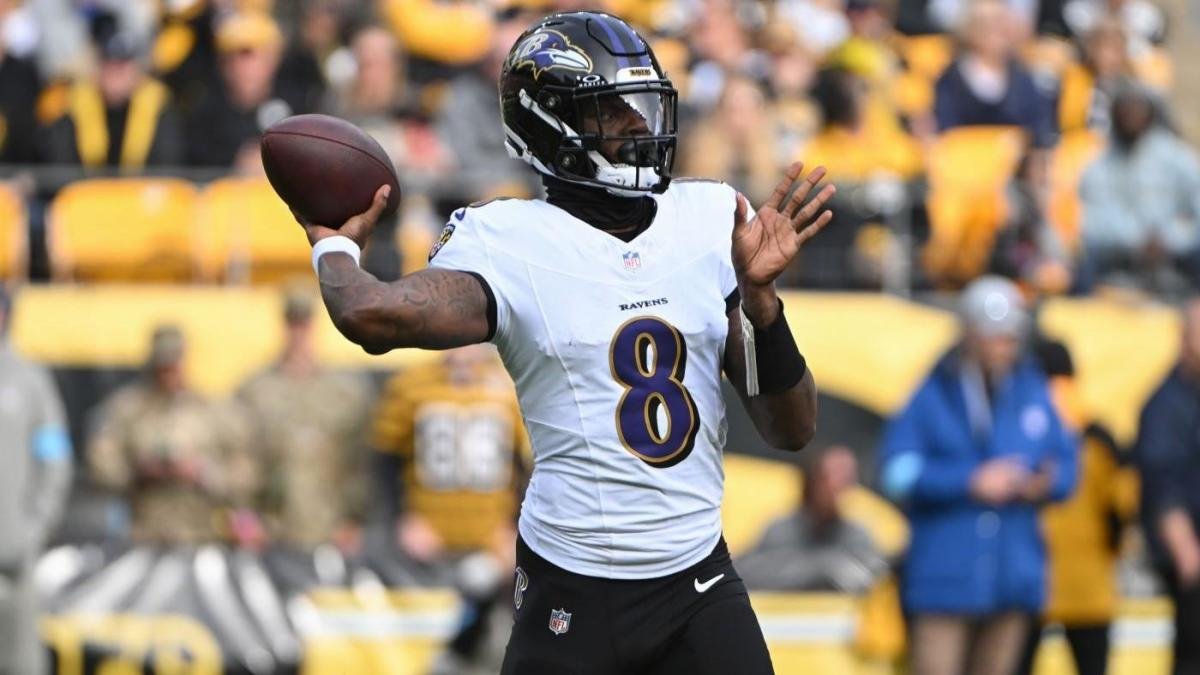AI Insights
Bills vs. Ravens props, NFL picks, SportsLine Machine Learning Model AI predictions: Jackson over 229.5 yards

The Buffalo Bills and Baltimore Ravens will meet for the third time in less than a calendar year in Week 1 of Sunday Night Football. Baltimore dominated in a Week 4 victory last year but the Bills got their revenge by prevailing in a Divisional Round playoff meeting. MVP winner Josh Allen and runner-up Lamar Jackson figure to feature prominently in NFL player props and NFL prop bets, but there are a host of other options to include in SGP picks. Derrick Henry and James Cook both scored a league-high of 16 rushing touchdowns in 2024 as each team heavily leans on the run game.
Even with that, the focus will be on the quarterbacks, and they share the same NFL prop lines for their passing numbers. Both have an over/under of 229.5 passing yards, in addition to having an NFL prop of 1.5 passing touchdowns. Meanwhile, Henry, who is coming off a 1,921-yard season on the ground, has a rushing yards bar of 82.5, while Cook’s is at 54.5. Zay Flowers leads all pass catchers with a receiving yardage over/under of 58.5 yards. Before betting any Ravens vs. Bills props for Sunday Night Football, you need to see the Bills vs. Ravens prop predictions powered by SportsLine’s Machine Learning Model AI.
Built using cutting-edge artificial intelligence and machine learning techniques by SportsLine’s Data Science team, AI Predictions and AI Ratings are generated for each player prop.
For Ravens vs. Bills NFL betting on Sunday Night Football, the Machine Learning Model has evaluated the NFL player prop odds and provided Bills vs. Ravens prop picks. You can only see the Machine Learning Model player prop predictions for Baltimore vs. Buffalo here.
Top NFL player prop bets for Bills vs. Ravens
After analyzing the Ravens vs. Bills props and examining the dozens of NFL player prop markets, the SportsLine’s Machine Learning Model says Ravens QB Jackson goes Over 229.5 passing yards (-114 at FanDuel). The last time Jackson took the field was against Buffalo in last season’s playoffs, and the two-time MVP had 254 passing yards and a pair of touchdowns through the air. That came in wintery weather conditions not exactly conducive to racking up yardage through the air, while Sunday night’s game calls for much milder weather.
Attacking Buffalo in the passing game is the preferred option as the Bills ranked 12th versus the run a year ago but were 24th in passing defense. The Bills also allowed the fifth-highest completion percentage and eighth-most passing touchdowns, as pass defense is their biggest weakness. Jackson, meanwhile, is coming off career highs in passing yards (4,172) and passing touchdowns (41), and now he has a new weapon to play with in five-time Pro Bowler DeAndre Hopkins. The SportsLine Machine Learning Model projects Jackson to blow past his total with 275.4 yards on average in a 4.5-star prop pick. See more NFL props here, and new users can also target the FanDuel promo code, which offers new users $300 in bonus bets if their first $5 bet wins:
How to make NFL player prop bets for Buffalo vs. Baltimore
In addition, the SportsLine Machine Learning Model says another star sails past his total and has seven additional NFL props that are rated four stars or better. You need to see the Machine Learning Model analysis before making any Ravens vs. Bills prop bets for Sunday Night Football.
Which Bills vs. Ravens prop bets should you target for Sunday Night Football? Visit SportsLine now to see the top Ravens vs. Bills props, all from the SportsLine Machine Learning Model.
AI Insights
IAB Europe unveils framework for AI publisher compensation

According to IAB Europe Data Analyst Dimitris Beis, the framework addresses “a paradigm of publisher remuneration for content ingestion” through three core mechanisms: content access controls, discovery protocols, and monetization APIs. The 11-page document establishes technical specifications for AI platforms accessing publisher content.
The framework emerges from documented traffic disruptions affecting digital publishers. According to Similarweb data cited in the report, referrals from AI platforms increased 357% year-over-year in June 2025, reaching 1.13 billion visits compared to 191 billion visits from organic Google search. However, news and media sectors experienced 770% traffic growth from AI platforms during the same period.
Subscribe PPC Land newsletter ✉️ for similar stories like this one. Receive the news every day in your inbox. Free of ads. 10 USD per year.
Cloudflare CEO Matthew Prince, speaking at a Cannes event, described shifting economics in content crawling. According to the framework, Prince reported the ratio of pages crawled to visitors referred increased from 2:1 a decade ago to 6:1 at the beginning of 2025 and 18:1 in June. OpenAI’s ratio reportedly grew from 250:1 to 1,250:1 during this timeframe.
The framework contradicts Google’s August rebuttal claiming stable year-over-year referrals from organic search. According to Chartbeat research covering 565 US and UK news websites, search referral consistency has been maintained over the past year. Google acknowledged certain query types may not generate clicks, similar to previous features like sports scores.
Adobe research conducted between July 2024 and February 2025 revealed AI-referred visitors stayed 8% longer on sites, viewed 12% more pages, and showed 23% lower bounce rates. However, these visitors lagged 9% behind non-AI-referred users in conversion rates.
The IAB framework proposes blocking unauthorised scraping through robots.txt files and Web Application Firewall methods. According to the document, unauthorised scraping increased 40% from Q3 to Q4 2024, with robots.txt compliance declining significantly.
Three content discovery mechanisms form the framework’s second component. Publishers would implement content access rules pages containing usage terms, scraper instructions, contact information, and content metadata. JSON-based content metadata would provide site summaries and IAB content taxonomy mappings. An llms.txt markdown file would contain information digestible by large language models.
The monetization component introduces Cost-per-crawl (CPCr) APIs featuring tiered pricing based on content type, bot classification, and access frequency. According to the framework, a more sophisticated LLM ingest content API would support per-query pricing through bid-response exchanges, enabling real-time content valuation.
The per-query model addresses retrieval-augmented generation, where AI platforms query publisher content directly rather than using pre-trained datasets. According to the document, this approach “more closely tracks value extracted from using publisher content and facilitates a fairer deal than cost-per-crawl.”
The framework identifies three implementation challenges. Controlling content access requires commitment from AI operators beyond technical measures, as multiple investigations suggest robots.txt compliance varies significantly. Auction dynamics differ from advertising markets, with single AI operators typically bidding rather than multiple competing buyers.
Content valuation presents complexity in determining marginal benefits of additional content for LLM responses. According to the framework, pricing decisions become probabilistic when based solely on metadata, potentially requiring verification mechanisms before content licensing.
Alternative models include revenue-sharing subscriptions, where Perplexity distributes 80% of user fees to participating publishers based on engagement metrics. Bilateral licensing agreements between major publishers and AI platforms provide direct compensation but concentrate benefits among large content creators.
Collective licensing schemes, similar to music rights societies, would create central compensation pools distributed according to usage measurements. According to the framework, this model requires regulatory action and allocation consensus.
Buy ads on PPC Land. PPC Land has standard and native ad formats via major DSPs and ad platforms like Google Ads. Via an auction CPM, you can reach industry professionals.
The framework establishes three requirements for viable compensation models. Effective content access control must reliably block unauthorised scraping. Purpose-limited use assurance prevents single-query content from training dataset repurposing. Transparency in pricing and trade-offs provides publishers visibility into content usage and valuation.
Current conditions fail to meet these requirements. According to the document, unauthorised scraping continues rising as the root cause of publisher concerns. Most publishers lack visibility into content usage after access, with only large publishers securing protections through bespoke AI operator agreements.
Cloudflare recently introduced AI crawler blocking capabilities and piloting systems where AI platforms declare content access purposes while publishers control permissions. According to the framework, the company develops signed requests and mTLS technologies for strengthening crawler identification.
IAB Tech Lab CEO Tony Katsur has advocated for regulatory intervention, urging publishers to advocate for their interests. According to the document, structural solutions enforcing access control, transparency, and verifiable usage represent prerequisites before remuneration models can function at scale.
The marketing community faces significant implications from these developments. Publishers experiencing declining traffic revenues must evaluate alternative monetization strategies beyond traditional advertising models. AI-powered search features reduce click-through rates while maintaining content dependency for training and inference processes.
Campaign strategies may require adaptation as zero-click searches increase and publisher content appears in AI summaries without corresponding traffic. Performance measurement frameworks need updating to account for content usage in AI responses rather than website visit metrics.
The framework represents industrywide momentum toward formalised compensation structures. According to the document, remuneration models likely diverge rather than converge on single mechanisms, with publishers anticipating patchwork approaches depending on market position and jurisdiction.
IAB Europe’s Artificial Intelligence Working Group seeks European publisher collaboration. The working group can be contacted through Dimitris Beis at beis [at] iabeurope [dot] eu for participation information.
Subscribe PPC Land newsletter ✉️ for similar stories like this one. Receive the news every day in your inbox. Free of ads. 10 USD per year.
Timeline
Subscribe PPC Land newsletter ✉️ for similar stories like this one. Receive the news every day in your inbox. Free of ads. 10 USD per year.
Summary
Who: IAB Europe Data Analyst Dimitris Beis authored the framework. The initiative involves publishers, AI platforms, and the IAB Tech Lab working group seeking European publisher collaboration.
What: A technical framework establishing three mechanisms for AI platform compensation to publishers: content access controls, discovery protocols, and monetization APIs including Cost-per-crawl and LLM ingest content APIs.
When: Published in September 2025, following industry discussions throughout 2025 including the July IAB Tech Lab summit and August working group launch.
Where: The framework applies globally but emphasises European implementation through IAB Europe’s Artificial Intelligence Working Group collaboration with European publishers.
Why: Addresses declining publisher revenues from increased AI content scraping (357% growth year-over-year) and zero-click searches (rising from 56% to 69% in May 2025) while establishing fair compensation for content used in AI training and inference.
AI Insights
Planned artificial intelligence centers strain energy grid – El Paso Inc.
AI Insights
Vikings vs. Falcons props, picks, SportsLine Machine Learning Model AI predictions: Robinson over 65.5 rushing

Week 2 of Sunday Night Football will see the Minnesota Vikings (1-0) hosting the Atlanta Falcons (0-1). J.J. McCarthy and Michael Penix Jr. will be popular in NFL props, as the two will face off for the first time since squaring off in the 2023 CFP National Title Game. The cast of characters around them has changed since McCarthy and Michigan prevailed over Washington, as the likes of Bijan Robinson, Justin Jefferson, Drake London and T.J. Hockenson now flank the quarterbacks. There are several NFL player props one could target for these star players, or you may find value in going after under-the-radar options.
Tyler Allgeier had 10 carries in Week 1, which were just two fewer than Robinson, with the latter being more involved in the passing game with six receptions. If Allgeier has a similar type of volume going forward, then the over for his rushing yards NFL prop may be one to consider. A strong run game would certainly help out a young quarterback like Penix, so both Allgeier and Robinson have intriguing Sunday Night Football props. Before betting any Falcons vs. Vikings props for Sunday Night Football, you need to see the Vikings vs. Falcons prop predictions powered by SportsLine’s Machine Learning Model AI.
Built using cutting-edge artificial intelligence and machine learning techniques by SportsLine’s Data Science team, AI Predictions and AI Ratings are generated for each player prop.
For Falcons vs. Vikings NFL betting on Sunday Night Football, the Machine Learning Model has evaluated the NFL player prop odds and provided Vikings vs. Falcons prop picks. You can only see the Machine Learning Model player prop predictions for Atlanta vs. Minnesota here.
Top NFL player prop bets for Falcons vs. Vikings
After analyzing the Vikings vs. Falcons props and examining the dozens of NFL player prop markets, the SportsLine’s Machine Learning Model says Falcons RB Bijan Robinson goes Over 65.5 rushing yards (-114 at FanDuel). Robinson ran for 92 yards and a touchdown in Week 14 of last season versus Minnesota, despite the Vikings having the league’s No. 2 run defense a year ago. After replacing their entire starting defensive line in the offseason, it doesn’t appear the Vikings are as stout on the ground. They allowed 119 rushing yards in Week 1, which is more than they gave up in all but four games a year ago.
Robinson is coming off a season with 1,454 rushing yards, which ranked third in the NFL. He averaged 85.6 yards per game, and not only has he eclipsed 65.5 yards in six of his last seven games, but he’s had at least 90 yards on the ground in those six games. Over Minnesota’s last eight games, including the postseason, six different running backs have gone over 65.5 rushing yards, as the SportsLine Machine Learning Model projects Robinson to have 81.8 yards in a 4.5-star prop pick. See more NFL props here, and new users can also target the FanDuel promo code, which offers new users $300 in bonus bets if their first $5 bet wins:
How to make NFL player prop bets for Minnesota vs. Atlanta
In addition, the SportsLine Machine Learning Model says another star sails past his total and has six additional NFL props that are rated four stars or better. You need to see the Machine Learning Model analysis before making any Falcons vs. Vikings prop bets for Sunday Night Football.
Which Vikings vs. Falcons prop bets should you target for Sunday Night Football? Visit SportsLine now to see the top Falcons vs. Vikings props, all from the SportsLine Machine Learning Model.
-

 Business2 weeks ago
Business2 weeks agoThe Guardian view on Trump and the Fed: independence is no substitute for accountability | Editorial
-
Tools & Platforms1 month ago
Building Trust in Military AI Starts with Opening the Black Box – War on the Rocks
-

 Ethics & Policy2 months ago
Ethics & Policy2 months agoSDAIA Supports Saudi Arabia’s Leadership in Shaping Global AI Ethics, Policy, and Research – وكالة الأنباء السعودية
-

 Events & Conferences4 months ago
Events & Conferences4 months agoJourney to 1000 models: Scaling Instagram’s recommendation system
-

 Jobs & Careers3 months ago
Jobs & Careers3 months agoMumbai-based Perplexity Alternative Has 60k+ Users Without Funding
-

 Podcasts & Talks2 months ago
Podcasts & Talks2 months agoHappy 4th of July! 🎆 Made with Veo 3 in Gemini
-

 Education3 months ago
Education3 months agoVEX Robotics launches AI-powered classroom robotics system
-

 Education2 months ago
Education2 months agoMacron says UK and France have duty to tackle illegal migration ‘with humanity, solidarity and firmness’ – UK politics live | Politics
-

 Podcasts & Talks2 months ago
Podcasts & Talks2 months agoOpenAI 🤝 @teamganassi
-

 Funding & Business3 months ago
Funding & Business3 months agoKayak and Expedia race to build AI travel agents that turn social posts into itineraries














